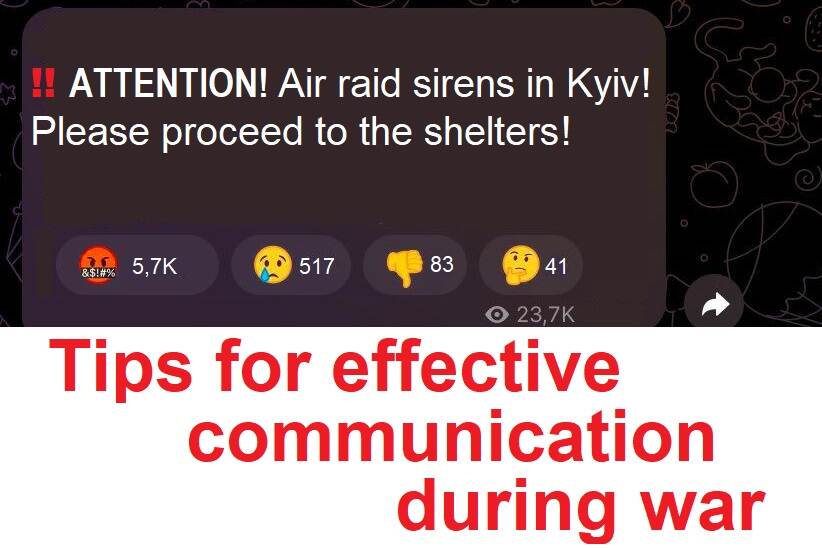How to communicate with colleagues and clients from Ukraine
The war changed not only Ukrainian lifestyle, but also the way we communicate. How to conduct business correspondence correctly, when it is better to call colleagues or partners and how to make communication effective
The question "How are you?" in personal correspondence today occurs as often as the word "hello". It is important for Ukrainians to receive information from our loved ones - whether they are safe, whether they have light and where they are during air raid allerts.
Working communication has undergone significant changes as well. How to ethically conduct business communication with colleagues and partners in war conditions - https://24tv.ua/business/ have collected 5 tips.
1. Show empathy
Air raid sirens sound regularly in Ukraine, the cities are under attack of russian missiles, people risk their lives every day and constantly balance between blackouts. On top of that your Ukrainian colleagues may worry about their loved ones at the front or in the hot points.
Therefore, it is extremely important to show care and empathy in business communication.
- "I hope you and your family are safe" – this phrase is more formal and suitable for communication with clients or partners.
- Internally you can use phrases specific to your team. The main thing is to ask if everything is okay, how the person feels and if he has the opportunity to work.
According to the Gradus study, 71% of Ukrainians have recently felt stressed or are very nervous. It is important that work does not cause extra stress for them which can be very harmful for the health.

2. Be open and frank
A recent Gallup study found that on average, companies lose $62.4 million a year due to poor internal communication. When employees are informed about all relevant issues, productivity increases by 20% - 25%.
In the conditions of war, employees need even more communication with managers and supervisors, because it is important for them to be sure about the future. Just imagine: in July, every tenth Ukrainian did not know for sure whether he would keep his job.
Therefore, every employee needs to understand the state of his company, whether any large-scale changes are planned, etc. And managers should know how well employees are ready to perform their tasks and how they can be helped in this.
Do not hide the "unpleasant" truth from employees. Conditionally, if the company is planning to cut back - everyone should be aware.
3. Take into account that keeping the working hours is not always possible.
Power outages strongly affect the work schedule of Ukrainians. Not everyone has the opportunity to be in touch from 9:00 a.m. to 6:00 p.m., they have to "work it up" later or on weekends. Therefore, do not demand quick written answers from your colleagues, if you have something urgent - it is better to call.
Very often your e-mail with an attachment will come late and your photo/video will not be downloaded immediately.
Setting deadlines for your Ukrainian partners or colleagues please consider the blackouts or problems with Internet connection.
In all these circumstances Ukrainians try hard to have work-life-war balance. It is better not to bother a person in messengers outside of working hours. Address important questions to e-mail or corporate chats.
4. Set the task as clearly as possible
In times of war, clarity of communication and attention to detail is extremely important. It is necessary to take into account that you and your colleague may have different schedules, so it will not be possible to discuss some tasks over the phone and fix unclarity.
Therefore, before sending a message, read it carefully and describe what you are interested in as clearly as possible. If this is a task, the letter should contain:
- a detailed description of the task and, possibly, step-by-step instructions for its implementation;
- materials that will help your colleague to complete the task (if you provide links to personal folders, make sure that access is open);
- deadline and your vision of the result.
That is, formulate the message in such a way that the colleague does not have to come back to you with clarifying questions.
5. Digital communication: from COVID to War
Covid apparently was a preparation period for Ukrainians to move on-line. Communication became more informal: from hard copies to pdf, from personal meetings to Zoom, from e-mails to Viber, What’s app, Signal messages, from office phone to mobile.
For Ukrainians communication during the war is extremely important, they constantly read news, follow Telegram channels and are online at the first opportunity.
Modern realities dictate new rules for business, work and communication. Now it is extremely important to show empathy towards colleagues, respect personal space and choose the right communication channels. It is these components that are the secret of the coordinated work of the team.
Based on the materials of Sonya Voloshyn